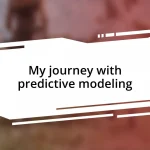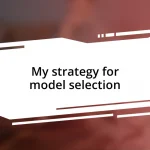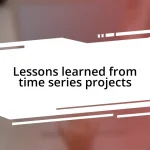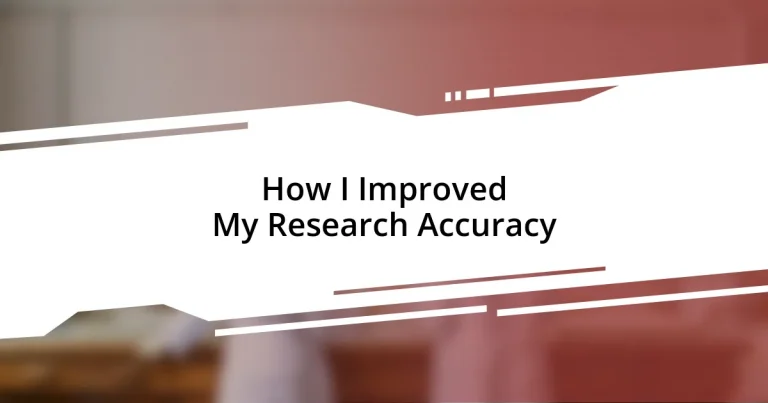Key takeaways:
- Research accuracy is crucial for maintaining credibility and impacting real-world decisions, emphasizing the need for sound methods and valid interpretations.
- Common research errors like sample bias and misinterpreting data can significantly affect findings; awareness and thorough review can prevent these pitfalls.
- Utilizing effective research tools such as citation management software and mind-mapping enhances organization and creativity in research work.
- Continuously reflecting on research practices and embracing feedback fosters personal growth and improves the overall quality of academic work.
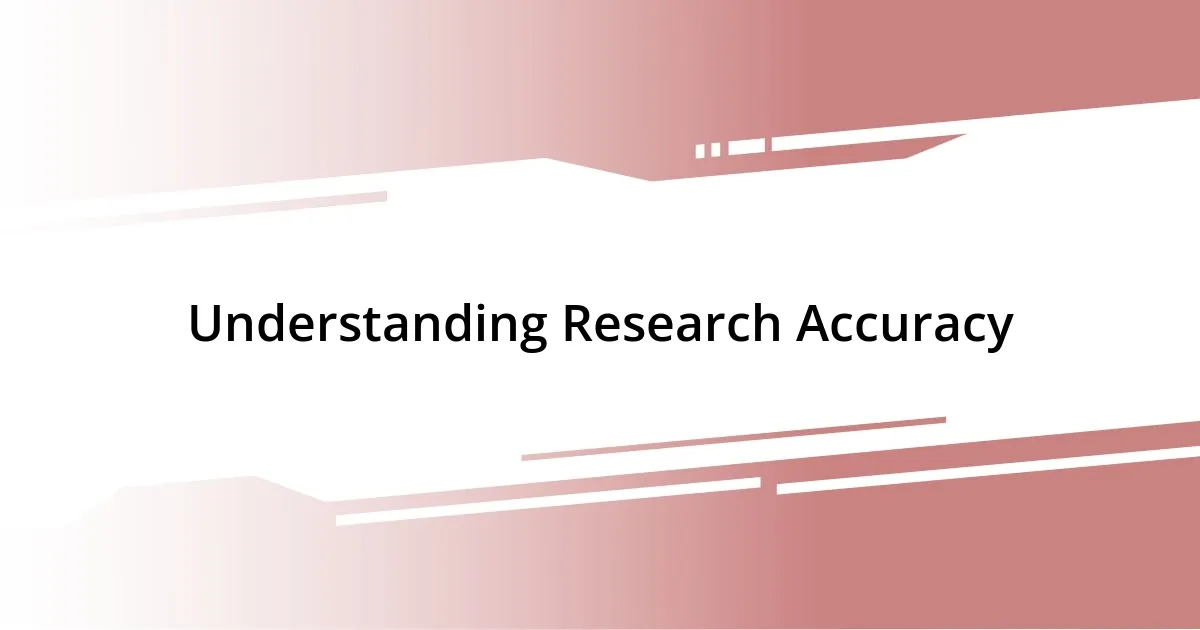
Understanding Research Accuracy
Understanding research accuracy is vital for both credibility and the advancement of knowledge. I remember the first time I published a paper that had a significant error; it felt like a gut punch. It made me reflect: how could something so simple slip through my fingers?
Accurate research isn’t just about collecting data—it’s about ensuring that your methods are sound and your interpretations are valid. I once conducted a study where I overlooked a key variable, which led to misleading conclusions. That experience taught me the importance of looking at research from multiple angles; it’s like piecing together a puzzle where every piece must fit perfectly.
Have you ever considered how much influence research accuracy has on real-world decision-making? For instance, when public policy is based on flawed studies, it can lead to dire consequences for communities. That realization has driven me to be meticulous in my own work, knowing that the implications of my findings extend far beyond the page.
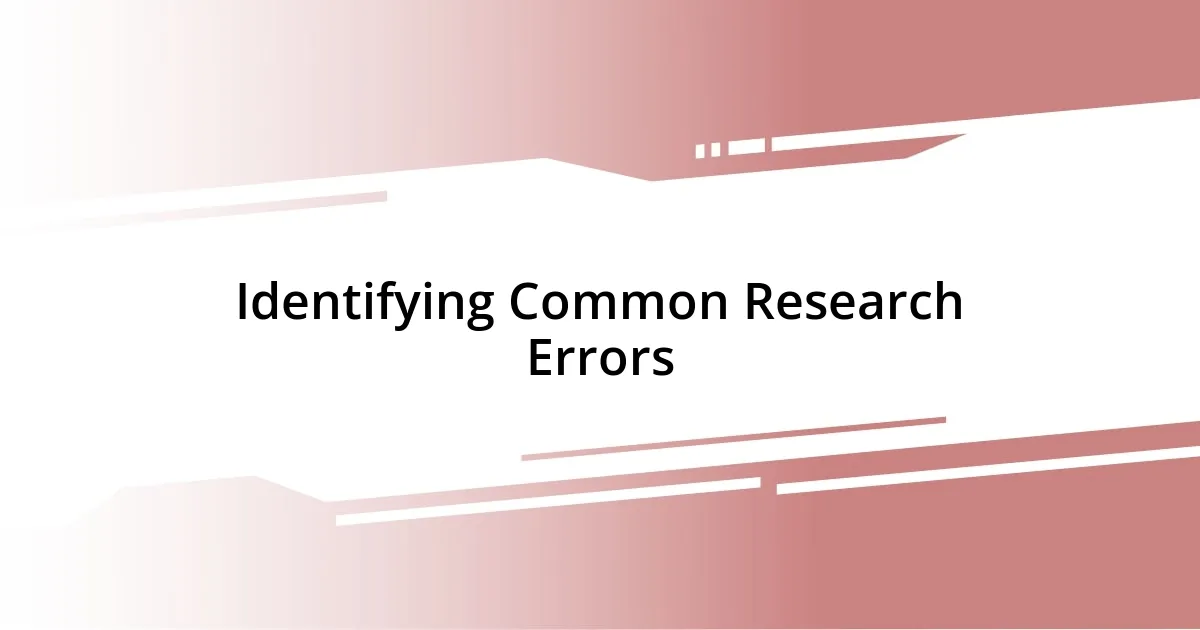
Identifying Common Research Errors
Identifying common research errors is crucial for enhancing the quality of our findings. I recall a time when I misinterpreted survey data simply because I didn’t fully understand the context in which the questions were answered. It was a humbling experience, and it made me realize how easy it is for small misunderstandings to snowball into larger issues. By being aware of potential pitfalls, I can actively guard against them in my own work.
Some common research errors include:
- Sample Bias: Gathering data from a non-representative group can skew results.
- Misinterpreting Data: Failing to consider outliers can distort the overall picture.
- Confirmation Bias: Focusing on data that supports pre-existing beliefs while ignoring contradictory evidence.
- Inadequate Research Design: A poor methodology can undermine the entire study.
- Overlooking Peer Review: Neglecting feedback from colleagues may lead to unrecognized errors.
I’ve learned that taking the time to review each of these areas can significantly bolster the reliability of my research.
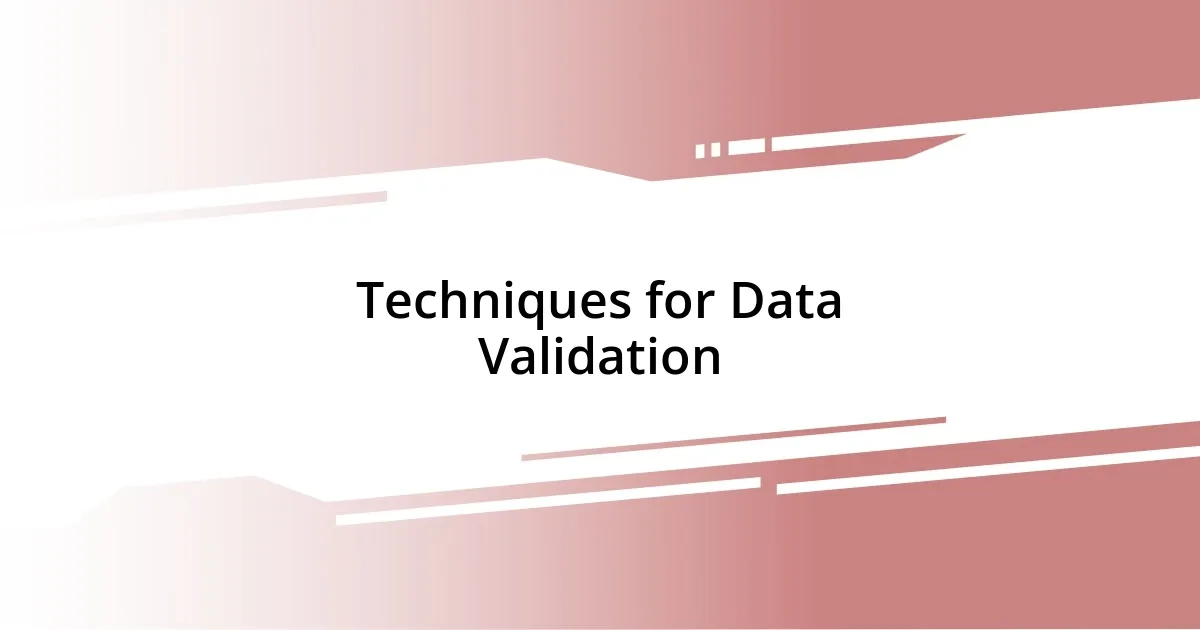
Techniques for Data Validation
Validating data is an essential step in ensuring the accuracy of research findings. One technique I found particularly useful is cross-verifying data with multiple sources. For instance, during a project on climate change, I gathered data from various meteorological databases. By comparing the figures, I noticed discrepancies that could have misled my conclusions. This experience reinforced the value of corroborating sources; it’s like checking your work in math class—you want to ensure your answers align before turning it in.
Another method I recommend is implementing statistical analysis to identify inconsistencies. While working on a social research project, I used regression analysis to spot outliers in my data set. This analysis revealed some unexpected results that, at first glance, seemed accurate but actually indicated flaws in data collection. Honestly, these moments can be a bit nerve-wracking, but they’re crucial for improving the overall integrity of my work.
Lastly, involving peer reviews can significantly enhance data validation. I remember discussing my findings with a colleague who pointed out potential biases in my approach. That outside perspective helped me refine my methods and improve the accuracy of my research. Engaging with others not only strengthens your analysis but also fosters a collaborative atmosphere where learning becomes a shared journey.
| Technique | Description |
|---|---|
| Cross-verifying Data | Using multiple sources to confirm the accuracy of the data collected. |
| Statistical Analysis | Employing statistical methods to identify and address inconsistencies or outliers in the data. |
| Peer Review | Seeking feedback from colleagues to uncover blind spots and biases in research. |
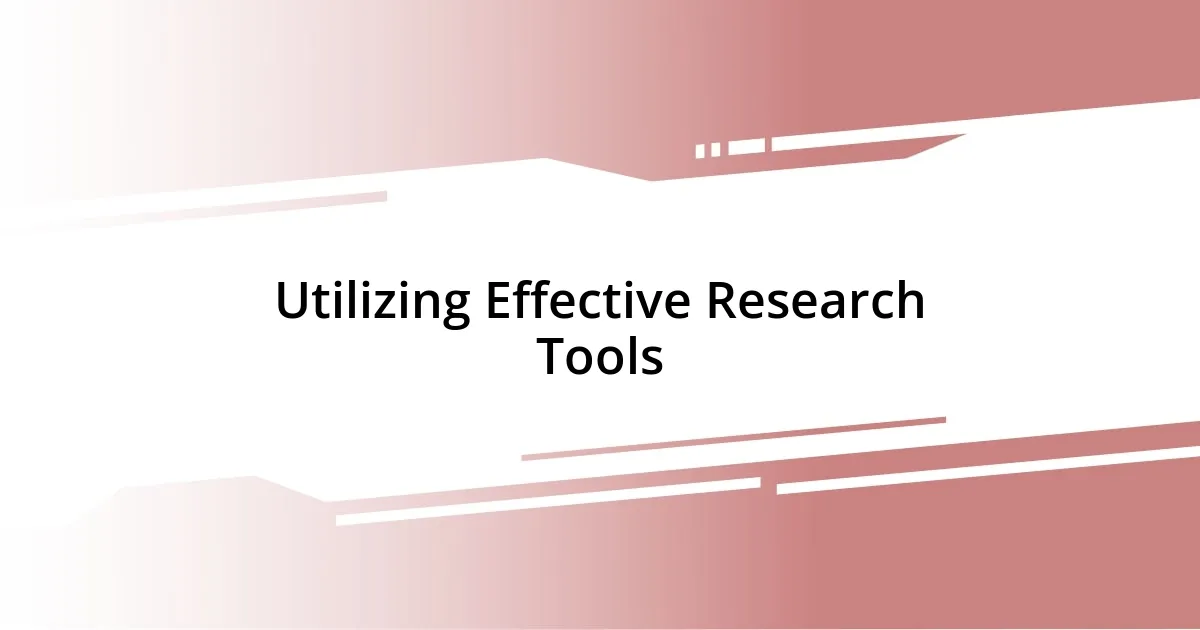
Utilizing Effective Research Tools
Utilizing research tools can feel like having a secret weapon in your academic arsenal. I vividly remember the first time I discovered online academic databases. As I navigated through them, it struck me how easily I could locate peer-reviewed articles relevant to my project. It was empowering! The depth and breadth of resources provided a solid foundation, transforming my research from guesswork into informed exploration.
When it comes to effective research tools, I can’t stress enough the value of citation management software. Early in my research career, I often found myself lost in a sea of references, struggling to keep track of where I found specific information. After trying out a citation tool, everything changed. I could easily organize my sources and format my bibliography in mere minutes. Can you imagine the relief of not having to manually sort through pages of notes? The time I saved allowed me to focus more on analyzing data rather than scrambling to remember where it came from.
Another tool I absolutely love is mind-mapping software. Picture this: I had a complex topic to tackle, and my thoughts felt jumbled. But once I dived into creating a visual outline, it was like flipping a switch. Suddenly, I could see connections between ideas more clearly. It not only helped me formulate a coherent narrative but also sparked new insights I hadn’t considered before. Have you ever tried mapping out your thoughts? It’s a game-changer for organizing your research and igniting creativity!
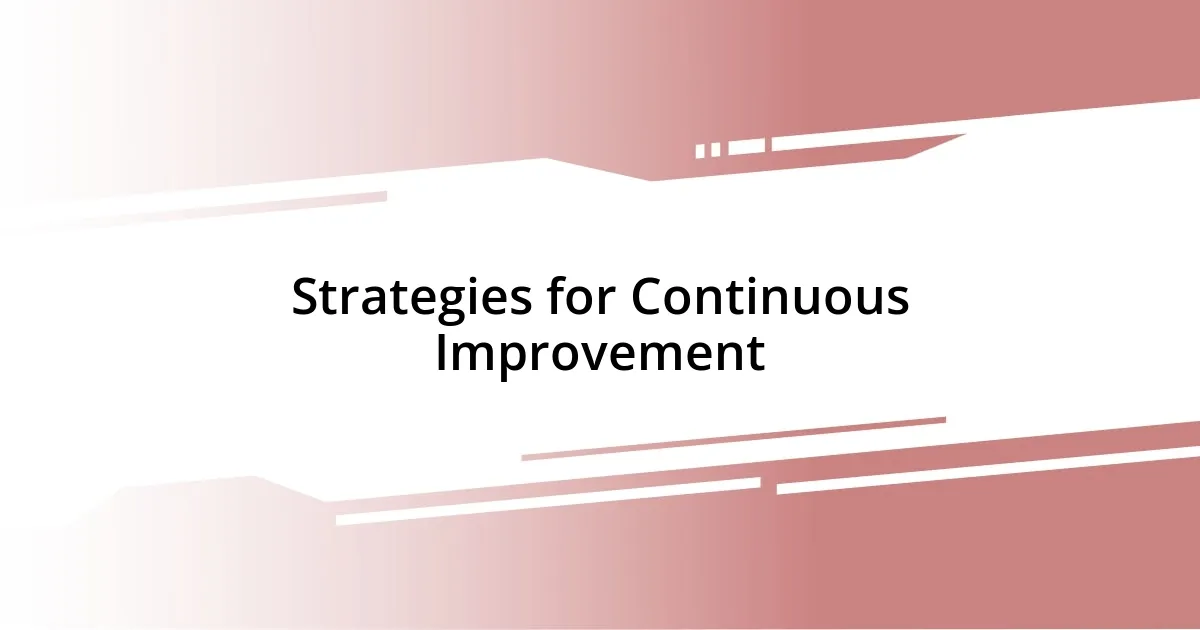
Strategies for Continuous Improvement
I’ve learned that continuous improvement isn’t a one-time effort; it’s an ongoing journey. One strategy I’ve adopted is setting aside dedicated time each week to reflect on my research practices. This time is sacred for me—it’s when I review what’s worked and what hasn’t. I often jot down my thoughts in a journal, which is revealing when I look back and see how much I’ve evolved. Can you imagine uncovering those “aha!” moments that really change your approach? It’s quite liberating.
Another effective strategy is embracing feedback loops. After a recent presentation, my peers provided feedback that challenged some of my assumptions. Initially, it stung a bit to hear my work critiqued, but I soon realized it was a golden opportunity for growth. I made a conscious effort to incorporate those insights into my subsequent research, and the quality of my work truly improved. Have you ever experienced that shift when constructive criticism turns into a powerful catalyst for change? It’s incredibly motivating.
Lastly, I can’t stress the importance of continual learning through workshops or online courses. Recently, I took a course on advanced statistical methods, and I was blown away by the techniques I hadn’t considered before. Embracing new knowledge not only enhances your skill set but also keeps your passion for research alive. When was the last time you learned something that transformed how you approach your work? For me, it’s a reminder that in research, as in life, there’s always something new to explore.
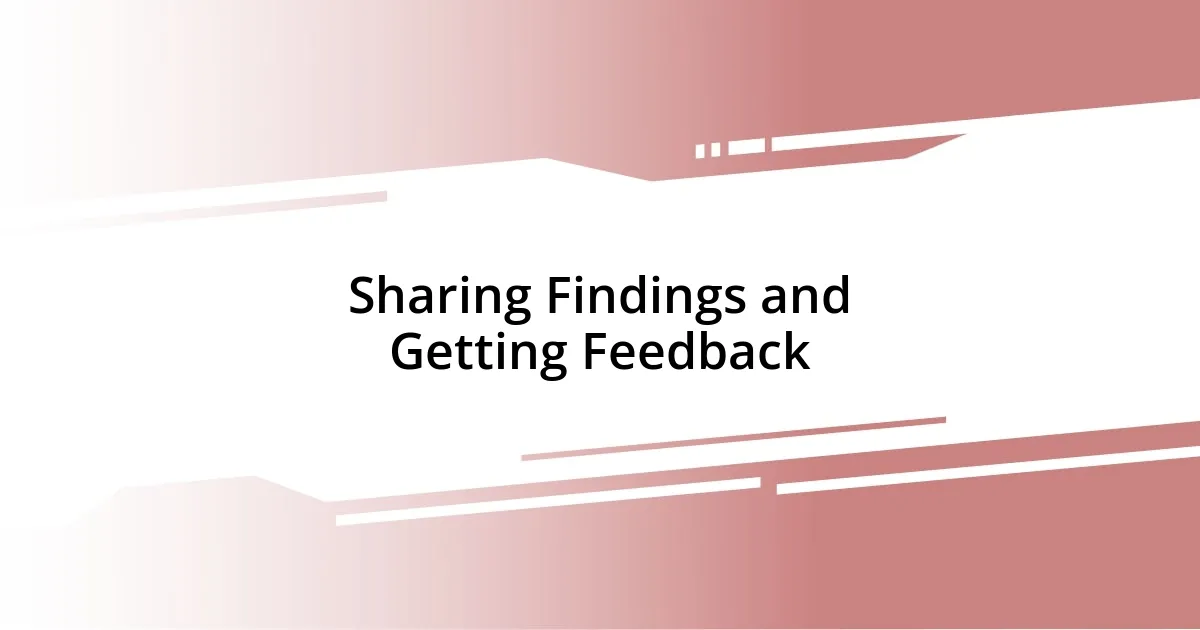
Sharing Findings and Getting Feedback
Sharing my findings with others has been one of the most rewarding aspects of my research journey. I remember a particular moment when I presented my findings at a local conference. The room was buzzing with energy, and as I shared my insights, I saw nods of agreement and curiosity from fellow researchers. Their questions were not only enlightening but also revealed gaps in my own understanding. Have you ever felt that spark of new ideas ignited by someone else’s perspective? It’s a powerful reminder that collaboration can elevate our work to new heights.
Receiving feedback can feel daunting, especially when you pour your heart into your research. I recall a time when I shared a draft with a mentor. The feedback was thorough and candid, pointing out areas I hadn’t considered. At first, I felt a mix of vulnerability and defensiveness, but after allowing myself to absorb that feedback, I realized just how essential it was. Have you experienced the shift from defensiveness to gratitude? That moment taught me that embracing constructive criticism isn’t just about polishing my work; it’s about fostering my growth.
Moreover, the act of openly discussing my findings with peers has led to unexpected collaborations. One day, during a casual lunch discussion about our research interests, we discovered complementary areas that could benefit from joint exploration. That conversation evolved into a co-authored paper that was richer than anything I could have done alone. Isn’t it fascinating how sharing findings can lead to new partnerships? The shared experience not only enriches the research but creates a sense of community that is invaluable in academia.
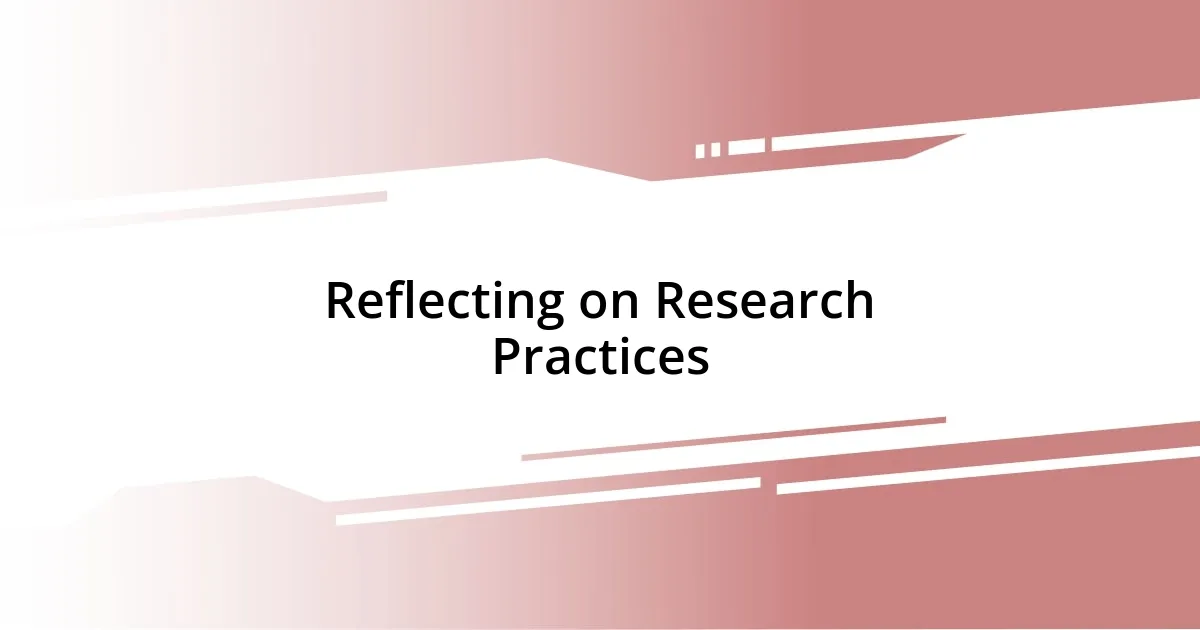
Reflecting on Research Practices
Reflecting on my research practices has been like holding up a mirror to my own methods and beliefs. I once made it a point to dedicate an entire weekend to evaluate my last project. As I sifted through my notes, I found recurring themes where I’d rushed during data collection. It struck me—were those shortcuts worth the risk? That weekend, I realized the value of patience in research. Isn’t it fascinating how slowing down can sometimes yield the most profound insights?
Taking stock of my research habits also involves recognizing my emotional responses to various challenges. I vividly recall a moment when I faced a setback due to a flawed dataset. Initially, frustration washed over me, casting a shadow on my motivation. However, through the reflection process, I realized that these setbacks weren’t failures but lessons wrapped in disappointment. Have you ever experienced that shift from discouragement to empowerment? I learned to shift my perspective—treating challenges as stepping stones rather than stumbling blocks changed the trajectory of my future research endeavors.
Moreover, I’ve grown to appreciate the transformative power of self-dialogue in my reflective practice. Recently, during a quiet morning with my coffee, I deliberated over a research question that had been niggling at me. Just by vocalizing my thoughts, I was able to clarify my stance and identify gaps that needed my attention. Do you find that speaking your thoughts out loud can sometimes illuminate ideas that were previously lost in the noise? It taught me that reflection is not merely a solitary activity; it’s a dialogue with oneself that can lead to groundbreaking revelations.




